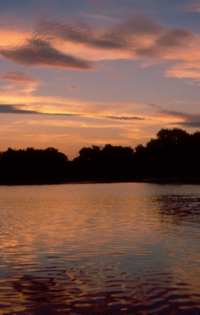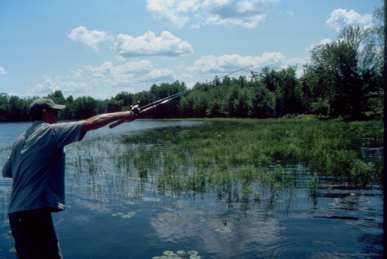|

Set Some Goals This Season
By
Tim Allard
 "Setting
goals, what does this have to do with fishing?" The answer: more
than one might initially appreciate. Goals are milestones we seek to
achieve and by setting goals and having a plan to reach them,
success and getting better go hand-in-hand. Always wanted to fish a
tournament, catch a muskie or learn to fly fish? Well, it's time to
make these things happen. "Setting
goals, what does this have to do with fishing?" The answer: more
than one might initially appreciate. Goals are milestones we seek to
achieve and by setting goals and having a plan to reach them,
success and getting better go hand-in-hand. Always wanted to fish a
tournament, catch a muskie or learn to fly fish? Well, it's time to
make these things happen.
What's a Goal?
The Concise Oxford English Dictionary defines goal as "An aim or
desired result - the designation of a journey." Personal goals
should be clearly defined, achievable, and able to be measured.
Goal-related measures are things like time and duration. For
example, I will be able to properly flip four of every five docks I
fish in two years time. Or, I will learn to launch my boat properly
this year, never spending more than five minutes on the main launch
(sorry, couldn't resist).
The length of time associated with each goal will vary. Several
short-term goals may lead to a larger long-term goal. Setting goals
is happening all the time in high schools, governments, art houses
and fitness centres, but let's specifically talk fishing here.
Focusing on Goals
Have you always wanted to do something fishing-related but never
got the chance? Setting goals will help you achieve these
aspirations. What's key to setting goals is that they are realistic
an achievable. If you want to fish your first bass tournament, pick
a local tourney and not a provincial-wide one. Of course, the latter
is achievable and you might want to make it a long-term goal for a
few seasons from now.
Here's a goal related fact: goals written down are more likely to be
achieved than ones that are not. Plain and simple. So whatever you
fishing ambitions are, write them down and reflect on them often.
Don't be afraid to write your goals down in places so you'll be
reminded of what you want to achieve. Tape them to your garage door
or by all your fishing gear so that you review before you hit the
water.
Planning: The Meat and Potatoes of Meeting Goals
The basic fact is that if you want to become a better angler, you
need to work on your weaknesses and make your strengths even
stronger. Setting goals will focus your effort on specific things,
but planning how you'll achieve your goals will really make you
successful. Plans don't need to be complex things they can include
the number of hours you ant to practice a week or a series of
short-term achievements leading up to a big, long-term
accomplishment.
The point is, to reach your goals you need to spend some time
planning the steps you'll take to be successful. Once you achieve a
few goals, you'll get energized about your accomplishments,
resulting in the setting of more goals and further development. Need
some suggestions for fishing-related goals? Consider these
categories:
Lures, Tackle and Presentations:
Choose a few lures or fishing techniques you want to improve on this
season and set some goals. To become better with a jig-and-pig a
friend of mine would fish a certain percentage of his non-tournament
time exclusively with this bait. He'd leave all his other rods and
tackle at home, taking only two flipping sticks and a few jigs for
the entire day. It may sound extreme, but he improved his confidence
in the bait and increased his success in tournaments.
Maybe you want to learn to tie five of your favourite flies, improve
your figure-8 technique, or become better at bottom bouncing -
whatever your aspirations consider setting some goals to improve
your knowledge and skills with lures. It'll pay off with more
catches and confidence.

Flipping requires confidence and accuracy;
improvement is as simple as setting a goal and working to achieve
it.
The Means to the End
Sport fishing media regularly focuses on lures and tackle to catch
fish, spending less time on secondary and supportive things. Boat
control is one area we all can take time to get better at, whether
fishing in the wind, using our trolling motor better, or improving
back trolling. Improving your use of hydrographic maps, GPS or your
fish finder can be other areas you seek to improve upon. Maybe you
take a course in GPS for example, or arrange a day to fish with
someone who's really skilled at boat control and get them to teach
you some maneuvering tips. Then practice their teachings on your
next outings.
Conserving the Fishery
Every year hundreds of volunteers take action to preserve our
fisheries. An excellent goal this year for any angler to consider is
how you can help sustain our fisheries. Maybe you want to take a kid
fishing twice this year, contribute 20 hours of your time to habitat
restoration or shoreline clean-up, or organize a catch-and-release
refresher for your local fishing club. These are just a few
suggestions and if you put your thinking cap on, you'll come up with
a lot more.
Setting goals can have a bad rap. Failed New Year's resolutions and
diets are probably two of the big culprits, but goal-setting is a
powerful tool to improve your fishing. Before the season starts, set
a few fishing-related goals. If you follow your plan, it's only a
matter of time before you reach your goals. Good luck and good
fishing!
|